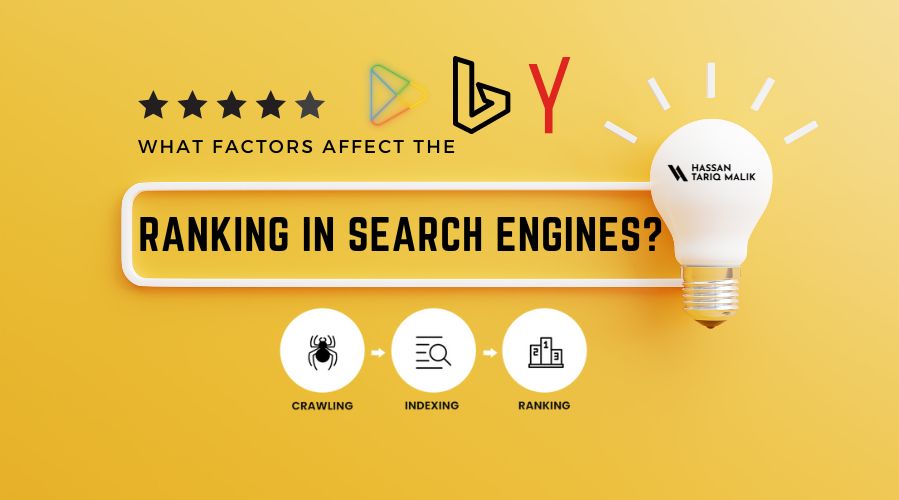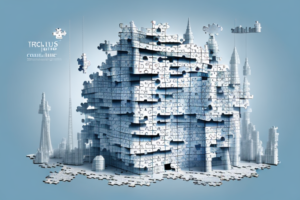Ranking in search engines is affected by many factors. You need to lower the impact of these factors by optimizing your website. These factors can reduce the visibility of your website in search engines or may decrease the website’s performance. Let’s explore what these factors are and how they affect ranking in search engines.
How does a Search Engine Work?
Search engines work through crawlers, also called spiders and bots. They collect the information from multiple web pages across the internet and store it in their extensive dataset indexes. Crawlers create interconnected web pages by following the links from one web page to another, which search engines can access. Adding new or updated pages to the index is called indexing.
Search engines have complex mathematical formulas called ranking algorithms. These algorithms evaluate and compare the pages in the index. Their comparison may be based on keywords, relevance, authority, popularity, and user experience. When you search for a query on search engines, the most relevant and useful pages related to this query are displayed in ranked order on the search engine results page (SERP), and this process is called ranking.
Factors Affecting the Ranking in Search Engines
Among the major factors that affect ranking, site structure and navigation is at the very top. Apart from that, there are internal and external links, robots.txt, sitemaps, and canonical tags that too can hinder the ranking of the website through crawling issues, determined by the search engine. These factors are crucial to determining how easily and frequently search engine bots can access and explore the site’s content. The crawl budget is also another factor that affects the crawling process.

Similarly, indexing rate is also another factor that affects ranking in search engines. Indexing majorly depends on the content quality and relevance to the niche. The freshness of the content, its uniqueness, and optimization also play a role in indexing. Based on these factors, a search engine understands and categorizes the site’s content as per user queries.
The ranking of a website is badly hampered if it has technical issues. These include website security, missing schema markup, UI/UX issues, and functionality. It also depends on the website’s speed, mobile friendliness, and user experience. All these factors are essential in deciding how well the site can satisfy the user’s intent and whether it provides a positive user experience or not.
How often do search engines crawl and index web pages?
The frequency of crawling and indexing is not specific to any website. It may vary depending upon several factors, like the size and authority of the website, its content’s freshness and uniqueness, and the optimization of the website. Search engines visit a website based on their own algorithms. They visit a website page and update it based on its relevance and importance. Social signals also speed up the crawling and indexing of the pages.
Generally, a search engine may crawl your web pages every few days to every month, and this duration may prolong or shorten depending upon the size of your website, as a bigger site may take longer than a smaller one with a few pages. Still, typically, a crawl may spread out over a few weeks.
After the completion of the crawling, the indexing starts, but depending upon your website’s content quality and technical situation, it also can take longer. You can check your pages’ crawling and indexing status using tools like Google Search Console or Bing Webmaster Tools.
What are some common crawling, indexing, and ranking problems, and how to fix them?
Crawling, indexing and ranking are the three important pillars of SEO, but various factors affect them and cause problems.
Crawling problems
One of the crawling problems is blocking the page from indexing through meta tags, leading to a page skip by a search engine. A search engine may not detect your page’s content and move to the next page. But how can you evaluate whether your web pages are facing this problem? You need to check your page code. If it has a directive: <meta name=”robots” content=”noindex” /> then delete it. You can also change this directive to <meta name=”robots” content=”index” /> to resolve this issue.
Another crawling issue is blocking the crawler’s access through the robots.txt file. If a crawler’s entrance is blocked, it can’t request your page or file from your site. To check if this problem exists on your site, find a disallow directive for your page and file and fix it. This directive looks like Disallow: /example-page/, and you can change it to Allow: /example-page/. You can also delete it to resolve this issue.
Broken links and redirects are other problems that block search engines from following the links and redirecting them to the destination page on your website. There are multiple online tools to detect 404 (page not found) issues and 301 (permanent redirect) errors, but most commonly, Google Search Console and Wix SEO Monitor are used.

You can delete or update the broken links to resolve this issue. You can also edit the links or redirect them and create and submit a new sitemap with the correct URLs. Because of these issues, search engine crawlers cannot find your website, which badly affects its ranking in search engines.
Indexing problems
These problems prevent search engines from storing and organizing your pages and files in their index. These problems include duplicate or low-quality content on your website, invalid or missing HTML metadata on your pages, and insufficient or incorrect structured data.
If you have low-quality duplicate content on your website, the search engines will only index some pages, ultimately making them low-authority pages. Use Google Search Console, and if you find any such issue on your website, delete the content, update and improve the content, or use canonical tags.
Similarly, if your web pages have invalid or missing HTML metadata, search engines can’t index them because they need to clearly understand what they are about and how to index them. You can add the HTML metadata elements, including title, description, keywords, etc., or correct them if they already exist.
Another problem is that insufficient or incorrectly structured data on your pages prevents the search engine from showing rich results for your pages, like snippets, images, videos, etc. You can add or correct the structured data elements to resolve this issue.
Ranking problems
Ranking problems prevent your pages or files from appearing high in the search results for relevant queries, and they may include irrelevant or outdated content, a poor user experience, or low authority and trust in your website.
Irrelevant and outdated content prevents the search engine from matching your pages with a user query intent and needs. You need to delete or modify the irrelevant content to fix this issue. You also create new content based on relevant and popular keywords for your niche.
A poor user experience leads to a low ranking of your website because the search engine will rank only the pages that provide a good user experience. To fix this issue, you must work on your website speed, security, design, interface, mobile friendliness, images, etc. You can also optimize your site performance, use the HTTPS protocol, or use responsive design or AMP.
Low authority on your website also prevents ranking because search engines care about providing credible and trustworthy content to users. You need to earn as many backlinks as you want, but be careful about the authenticity of the source. Always aim at acquiring quality backlinks, and you should delete any spammy or toxic backlinks that you already have on your website to improve its reputation and ranking in search engines.
Final Analysis
To improve ranking in search engines, you need to optimize your website correctly for each issue. Make your website accessible, make your website content organized, unique, latest, and accurate, and focus on the relevancy between your niche and your website structure and content. Enhance the user experience, website speed, and site design as well. Make your website more mobile-friendly, as many users use mobiles while searching and scrolling on the search engines. By applying these tips and tricks, you can make your website more crawlable, indexable, and rankable.
________________________________________
References
Moz. “How Search Engines Work: Crawling, Indexing, and Ranking – Beginner’s Guide to SEO.” Moz, 19 Apr. 2023, moz.com/beginners-guide-to-seo/how-search-engines-operate.
Stein, Adriana. “An Introduction to Crawling, Indexing, and Ranking for SEO.” Wix SEO Hub – New, 24 May 2023, www.wix.com/seo/learn/resource/intro-to-crawling-indexing-ranking-for-seo.
Smith, Chris Silver. “The 4 Stages of Search All SEOs Need to Know.” Search Engine Land, 10 Aug. 2022, searchengineland.com/search-stages-crawling-rendering-indexing-ranking-387057.
“Difference Between Crawling and Indexing in Search Engine Optimization SEO.” GeeksforGeeks, 19 Apr. 2023, www.geeksforgeeks.org/difference-between-crawling-and-indexing-in-search-engine-optimization-seo.
_______________________________________
HASSAN TARIQ MALIK
Freelance SEO Consultant | Technical SEO | Digital PR | Rebranding | Content Marketing









